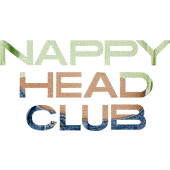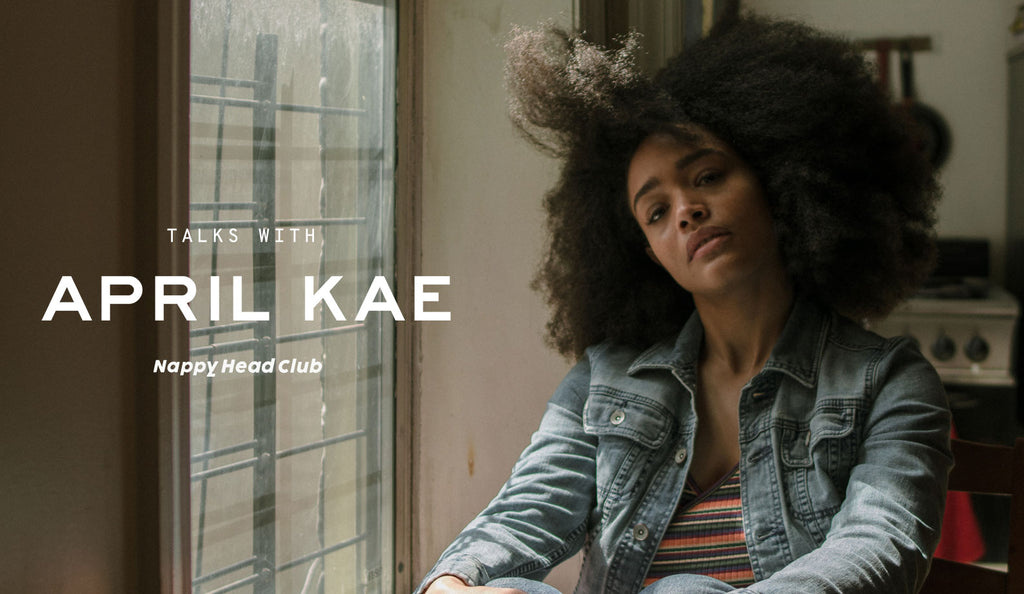Have you always had a good relationship with your hair?
April:I didn’t have a big chop, or go natural in the last five years like other people. When I was 13, I did teenager shit to my hair like flat ironing, dying my ends, putting it in two braids. I was 16 when I moved out... my parents were kinda hippies. My mom [is] black – my dad is white. My mom didn’t really approve of me straightening my hair, but for the most part she was like, “do you boo boo.”
One day, I just cut off all [my] dead hair! I guess it was a big chop but the term “big chop” didn’t exists back then. I didn’t have a defined haircut at the time, I was just putting in gel and leave-in. It was just “there” and it just kept growing.
I worked on Wall Street when I first moved to NY. Everyone I worked with was white and so I stood out a lot and I did everything to not stand out. I would brush my hair back in a tight bun–I did a lot of that. It's been a slow process but it's grown as I have. Good relationship with my hair? Overall I’d say we've been okay- we've been friends.
When you used to work on wall street you mentioned you did lot to not stand out, but your known for a big signature fro. Do you feel your hair attracts a lot of attention and how do you deal with that?
April: I don't really wear my hair out when I'm in my day-to-day because it does get a lot of attention. It’s probably counterintuitive, given the fact that I'm a model, but I really don't like being looked at. I don't really like attention in that way. I love when I'm playing a show on stage and the focus is on the music. It's one of those things that we were talking about, that we’re working through.
I do struggle with people thinking I'm attractive when I'm walking down the street because of a lot of the imagery and messaging I got as a little girl... You’re not supposed to be sexy, you're not supposed to be hot, or that would attract the wrong kind of attention from men. Anyone but a black woman saying something about my hair makes me mad! Haha.
When I say ‘makes me mad,’ [I mean] it's otherising. It’s annoying. It grows out of my fucking head. Why do you get joy out of me just wanting to be myself? Maybe it’s that, the anger, the history of beautiful black women with coarse hair. I was thinking of Thomas Jefferson raping women who look like me, and then the lightskin babies are the ones who are the house-slaves. That’s what comes to mind.
What do you mean when you say ”Otherising,” when people comment on your hair?
April: I think: pointing out difference, not feeling included, or feeling excluded. Think Sara “Saartjie” Baartman.
Sure, it's an appreciation of differences, but it’s a feeling of exclusion. On the street, I get this feeling [from people] of self-congratulation. They think that by telling me I’m beautiful, because I’m ‘unique’, they are special. Which then implies that most people don’t think I’m beautiful.
And by most people, I mean people who hold power. I’m 5’ 4”, 140lbs, I don’t have abs, I have a wide nose. I’m pretty “XYZ for a ‘short girl” / “for a ‘black girl”/ “for a nappy headed girl.”
It feels like beautiful despite.

How do you manage the energy you get from your political or controversial post on social media?
April: There is a range. I get racists. I get closed minded people who are like, ”shave your armpits! Fuck you, you black entitled...” They're trolls. I just block them. I don’t have time. Sometimes I think about how many followers I’d have for every time I blocked someone who said ”shave your armpits!”
I'm trying to create a safe space for black women. But if she isn’t trying to be in the safe space with me, then I don't need her. I'm trying to protect and give love to people who want it, because there's so little of it. I'm like a mama bear, I feel like I have a lot of that black mother energy where I'm so loving, and I am fiercely protective.
One of my favorite things on Instagram is in the comments, some of my friends or followers will be like ‘umm excuse me’ so a lot of the times I don't have to. I have a day job, I'm a model, a musician, an influencer AND I like to have good relationships with my family and friends, so I just don’t have the time to be debating with people.
I [do] have really good debates with my friends, or with people who I know. I try to read the Wall Street Journal. I try to give myself exposure to different viewpoints. But from some asshole on Instagram? That’s not the way to do it.
Sometimes I'll have really great conversations, for example: one of the best Instagram moments was when I posted, “Islam is not the enemy” and a Iranian woman DM’d me and told me about her associations with Islam in her country. For her it was oppressive, and from her experience Islam is the enemy. It's such a different world and I didn't know what it's like to be a woman in Iran or a feminist. It was a great conversation and we are great friends now! While Islam is not the enemy, but it’s more [complicated] than what I was getting at. The next time I talk about Islamophobia I will have more insight.

You talk a lot about safe spaces a lot, do you have any recommendations for anyone wanting to create their own safe space?
April: This checklist helps to create a inclusive place for an event. Everything from [having] a sliding scale, making sure everyone can pay to get in, to accessibility for different disabilities.
Frankly, I don't think I've put on an event where I was able to check every box, because not every system is set up for that. I had a show where there were elevators, and a woman was afraid of elevators. The event was on the roof top and there was no way she was going to walk up 50 flights of stairs, so she had to go home. That was on the list too, but I didn't know, you know? But now, if I have an event with elevators, I’ll be sure to let people know, and now I try not to have events on rooftops.
There are so many specific things you have to do to make sure a space is inclusive and safe. But following that, I think intentionality, and who is creating the space, has so much to do with it. My intention is to create a space that's not about me. I think if you have goodness and honesty and love as the main goal in a space–supporting each other–then you'll have a successful safe space.
Do you feel that safe spaces are necessary for black womxn?
Black cis- and trans- women are some of the most vulnerable people in this country (aside from Indigenous women). We are raised to believe we are not safe anywhere, and that it's our responsibility to reduce the harm we'll inevitably face even as the reality of the pain we endure is systematically ignored. But safety enables us to thrive. On Maslow's hierarchy of needs, safety comes just after food, water, and shelter. Which is to say, safety is necessary for us to achieve love, self-esteem, and self-actualization. So, to create a safe space for Black women is to allow this. Also, for me, a safe space for Black women doesn't mean that other people are excluded from the space. Rather, it means Black women's safety is prioritized. I use this framework because if the demographics of a space are similar to the demographics of the wider society, perhaps the safe spaces I create can serve as a model.





JOIN THE DISCUSSION (0 comments)